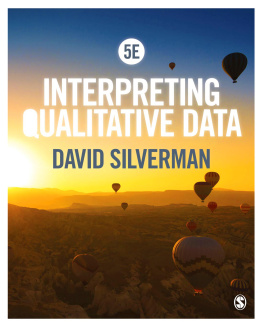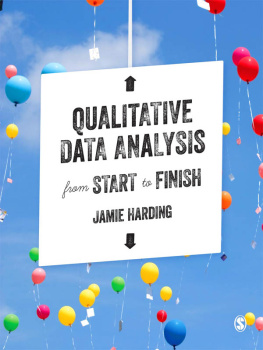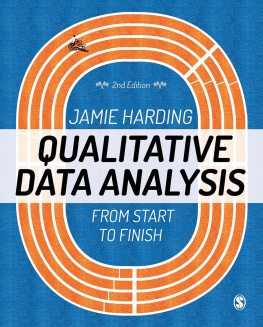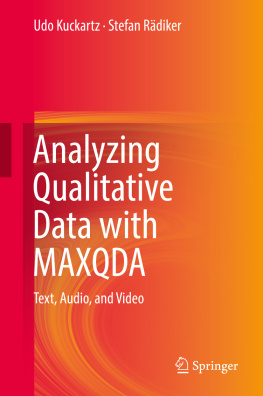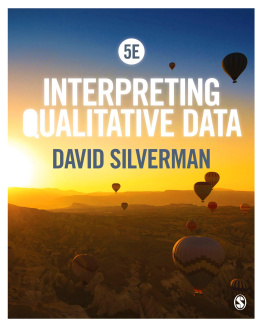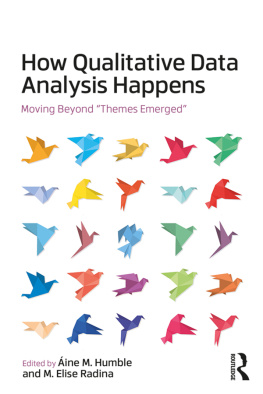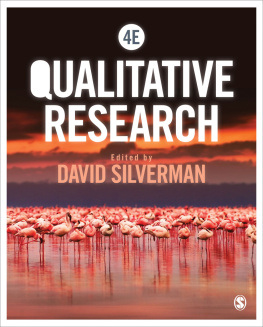Silverman - Interpreting qualitative data
Here you can read online Silverman - Interpreting qualitative data full text of the book (entire story) in english for free. Download pdf and epub, get meaning, cover and reviews about this ebook. year: 2015, publisher: SAGE Publications Ltd, genre: Politics. Description of the work, (preface) as well as reviews are available. Best literature library LitArk.com created for fans of good reading and offers a wide selection of genres:
Romance novel
Science fiction
Adventure
Detective
Science
History
Home and family
Prose
Art
Politics
Computer
Non-fiction
Religion
Business
Children
Humor
Choose a favorite category and find really read worthwhile books. Enjoy immersion in the world of imagination, feel the emotions of the characters or learn something new for yourself, make an fascinating discovery.
Interpreting qualitative data: summary, description and annotation
We offer to read an annotation, description, summary or preface (depends on what the author of the book "Interpreting qualitative data" wrote himself). If you haven't found the necessary information about the book — write in the comments, we will try to find it.
Interpreting qualitative data — read online for free the complete book (whole text) full work
Below is the text of the book, divided by pages. System saving the place of the last page read, allows you to conveniently read the book "Interpreting qualitative data" online for free, without having to search again every time where you left off. Put a bookmark, and you can go to the page where you finished reading at any time.
Font size:
Interval:
Bookmark:

5E
- David Silverman


SAGE Publications Ltd
1 Olivers Yard
55 City Road
London EC1Y 1SP
SAGE Publications Inc.
2455 Teller Road
Thousand Oaks, California 91320
SAGE Publications India Pvt Ltd
B 1/I 1 Mohan Cooperative Industrial Area
Mathura Road
New Delhi 110 044
SAGE Publications Asia-Pacific Pte Ltd
3 Church Street
#10-04 Samsung Hub
Singapore 049483
David Silverman 2014
First edition published 1993
Second edition published 2001. Reprinted 2003, 2004, 2005, 2006
Third edition published 2006. Reprinted 2007, 2008 (twice), 2009 and 2010 (twice)
Fourth edition published 2011. Reprinted twice in 2013
Apart from any fair dealing for the purposes of research or private study, or criticism or review, as permitted under the Copyright, Designs and Patents Act, 1988, this publication may be reproduced, stored or transmitted in any form, or by any means, only with the prior permission in writing of the publishers, or in the case of reprographic reproduction, in accordance with the terms of licences issued by the Copyright Licensing Agency. Enquiries concerning reproduction outside those terms should be sent to the publishers.
Library of Congress Control Number: 2014938058
British Library Cataloguing in Publication data
A catalogue record for this book is available from the British Library
ISBN 978-1-4462-9542-7
ISBN 978-1-4462-9543-4 (pbk)
Editor: Katie Metzler
Assistant editor: Lily Mehrbod
Production editor: Ian Antcliff
Copyeditor: Neil Dowden
Marketing manager: Ben Griffin-Sherwood
Cover design: Shaun Mercier
Typeset by: C&M Digitals (P) Ltd, Chennai, India
Printed and bound in Great Britain by Ashford Colour Press Ltd


For my friends at the Nursery End in the hope (but not the expectation) that Middlesex will finally achieve success in English crickets county championship
Be sure to visit the companion website to this book at https://study.sagepub.com/silvermaniqd5e to find a range of teaching and learning materials for both lecturers and students, including the following:
- Methodspace page: link to a Methodspace group for the book (www.methodspace.com/group/silverman) where readers can give feedback, discuss issues and pose questions about their research directly to the author.
- Additional case studies and examples: engaging and relevant case studies to help illustrate the main concepts in each chapter.
- Full-text journal articles: full access to selected SAGE journal articles related to each chapter, providing students with a deeper understanding of key topics.
- Links to useful websites, podcasts and YouTube videos: an assortment of direct links to relevant websites for each chapter.
- Student exercises: thought-provoking questions for each chapter that are intended to help students think critically about their own research.
- Model answers: to exercises found in this book.
- Helpful tips: valuable considerations for students doing their own research.
- Recommended reading: suggestions for further reading.
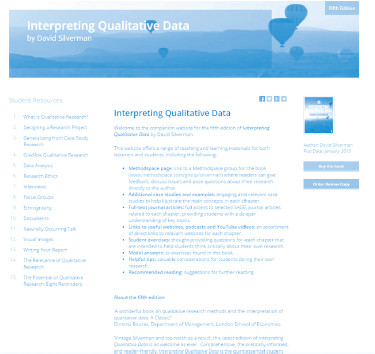
He is the author of Interpreting Qualitative Data (fourth edition, 2012), Doing Qualitative Research (fourth edition, 2013) and A Very Short, Fairly Interesting, Reasonably Cheap Book about Qualitative Research (second edition, 2013). He is the editor of Qualitative Research (third edition, 2011) and the Sage series Introducing Qualitative Methods. In recent years, he has offered short, hands-on workshops in qualitative research for universities in Europe, Asia, Africa and Australia. He is a Visiting Professor at the Business School, University of Technology, Sydney.
Now retired from full-time work, he aims to watch 100 days of cricket a year. He also enjoys voluntary work in an old peoples home where he sings with residents with dementia and strokes.
This new edition has been substantially rewritten. Drawing upon comments from readers of the fourth edition, I have made the following changes:
- A new chapter on generalising from case study research which addresses the perennial issue of How many cases do you need?
- The organisation of the book is simplified: there are now only three sections and discussion of how to make qualitative research credible is moved to an earlier position, immediately after the chapter on case study research.
- Throughout the book, consistent use is made of two qualitative research models: naturalism and constructionism. This is in line with current usage and, I believe, makes the book easier for students to follow.
- Many more recent case study examples drawn from a broad range of disciplines including business, education, social work and geography as well as health studies.
- Greater attention to research based on Internet data including netnography (Kozinets, 2010).
- has a new introduction outlining the meaning of research.
- now includes a discussion of mixed methods.
- a new section on netnography.
- has new sections on organisational documents (including a discussion of corporate social responsibility) and on documents of everyday life (e.g. blogs and diaries).
- now makes it clear that writing a research report should not be a linear process.
- are illustrated with case examples from a wider range of disciplines.
- Where the number of an exercise appears in red, the books website includes a model answer.
- For ease of access, all links provided in this book now appear in the website. All links listed in this book were checked in early 2014.
My aim has been to develop the book further as an undergraduate introductory qualitative methods text which complements the postgraduate focus of Doing Qualitative Research. Rather than attempting to turn this volume into simply an undergraduate research project book, my focus is on introducing first-degree students to the theory, methods and practice of qualitative research. In this way, I have tried to make this book suitable for both taught courses and research projects at the undergraduate level.
Font size:
Interval:
Bookmark:
Similar books «Interpreting qualitative data»
Look at similar books to Interpreting qualitative data. We have selected literature similar in name and meaning in the hope of providing readers with more options to find new, interesting, not yet read works.
Discussion, reviews of the book Interpreting qualitative data and just readers' own opinions. Leave your comments, write what you think about the work, its meaning or the main characters. Specify what exactly you liked and what you didn't like, and why you think so.

